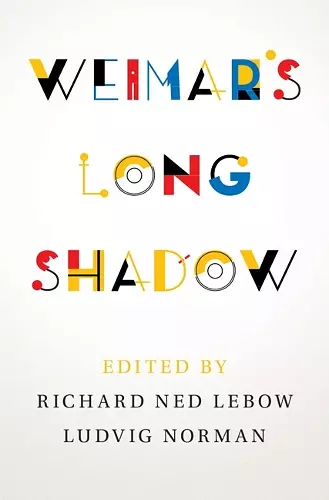Weimar's Long Shadow
Richard Ned Lebow editor Ludvig Norman editor
Format:Paperback
Publisher:Cambridge University Press
Published:27th Jun '24
Currently unavailable, and unfortunately no date known when it will be back
This paperback is available in another edition too:
- Hardback£80.00was £80.00(9781009484343)

Invokes the political and cultural lessons drawn from the collapse of the Weimar Republic to understand contemporary threats to democracy.
The political and cultural lessons drawn from the collapse of the Weimar Republic are invoked in order to understand contemporary threats to democracy. The contributors challenge the validity of these lessons, the extent to which they reflect political agendas, and how they are brought to bear on contemporary political problems.Weimar casts a long shadow over post-war political thought. The Weimar Republic is used to understand contemporary threats to democracy and to critique or defend modernity. It has generated a series of political lessons that are invoked whenever democracies are challenged. This book questions the historical validity of most of these lessons and their applicability to contemporary political orders. It shows how Weimar lessons are often influenced by partial and superficial readings of events, often intended to advance particular political projects. The chapters give detailed accounts of how so-called Weimar lessons have influenced, if not shaped, political debates in Germany, elsewhere in Europe, and the United States.
'Weimar's Long Shadow magnificently captures the relevance of Germany's first failed experiment in democracy for our own troubled times. The authors do not exaggerate the similarities. Rather, in essays that range from treatments of Strauss and Trumpian Straussians, to militant and social democracy, and the TV series Babylon Berlin, they illuminate concerns central to us now.' David Dyzenhaus, University Professor of Law and Philosophy, Toronto
'This stimulating book shows that Weimar is more than a negative model for the collapse of democratic regimes. It makes a strong case for using analogies as a fruitful device for a more careful consideration of the complexities of modernity. The case of Weimar therefore continues to be of great systematic value to both international historians and political scientists.' Wolfram Pyta, University Professor and Head of the Department of Modern History, University of Stuttgart
'As the paradigm of democratic fragility, the Weimar Republic has both sensitized and blinded thinkers to the dangers of later situations. Even as they anatomize the mechanisms that flatten analogy into 'lessons learned,' these essays exemplify a better use of history: open-ended engagement with cases to generate questions for the present.' Dorothy Noyes, The Ohio State University
'Highly recommended.' G. P. de Syon, Choice
ISBN: 9781009484305
Dimensions: 229mm x 152mm x 15mm
Weight: 417g
286 pages